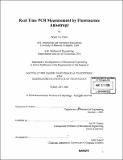Real time PCR measurement by fluorescence anisotropy
Author(s)
Crane, Bryan Lee, 1976-
DownloadFull printable version (32.19Mb)
Alternative title
Polymerase chain reaction measurement by fluorescence anisotropy
Other Contributors
Massachusetts Institute of Technology. Dept. of Mechanical Engineering.
Advisor
Ian W. Hunter.
Terms of use
Metadata
Show full item recordAbstract
Real-time polymerase chain reaction (PCR) is the gold-standard for quantitation in both mutation and gene expression analyses. Already this technique has found valuable clinical application in disease diagnosis and progression evaluation. As the number of known gene-disease correlations continues to rise, there will be increased demand for higher throughput and decreased cost for these analyses. Present real-time PCR measurement is based upon the fluorescent intensity of either intercalating dyes or oligonucleotide probes. Intercalating dye methods suffer from a lack of binding specificity, while probe methods are expensive and require increased assay optimization. In this thesis, a new method is presented for monitoring real-time PCR that utilizes the fluorescent anisotropy (FA) of labeled primers. FA, when measured at constant temperature, is indicative of the molecular mass to which the fluorophore is attached. Specificity is improved with the FA method over the use of intercalating dyes since the selective binding of primers is required for signal change. Assay complexity and cost are reduced compared to fluorogenic probe methods since the probes are eliminated. The design of a prototype instrument, which successfully implements this new method, is presented. Instrument and assay performance are compared to intercalating dye assays run in commercially available instrumentation. Theoretical limits on performance are also presented and compared to experimental results. Excellent repeatability and linearity are observed with respect to these benchmarks. This new method, having both high specificity and low optimization complexity, is expected to be particularly applicable to the demanding robustness requirements of nano-scale PCR.
Description
Thesis (Ph. D.)--Massachusetts Institute of Technology, Dept. of Mechanical Engineering, February 2005. Page 230 blank. Includes bibliographical references (p. 181-190).
Date issued
2005Department
Massachusetts Institute of Technology. Department of Mechanical EngineeringPublisher
Massachusetts Institute of Technology
Keywords
Mechanical Engineering.